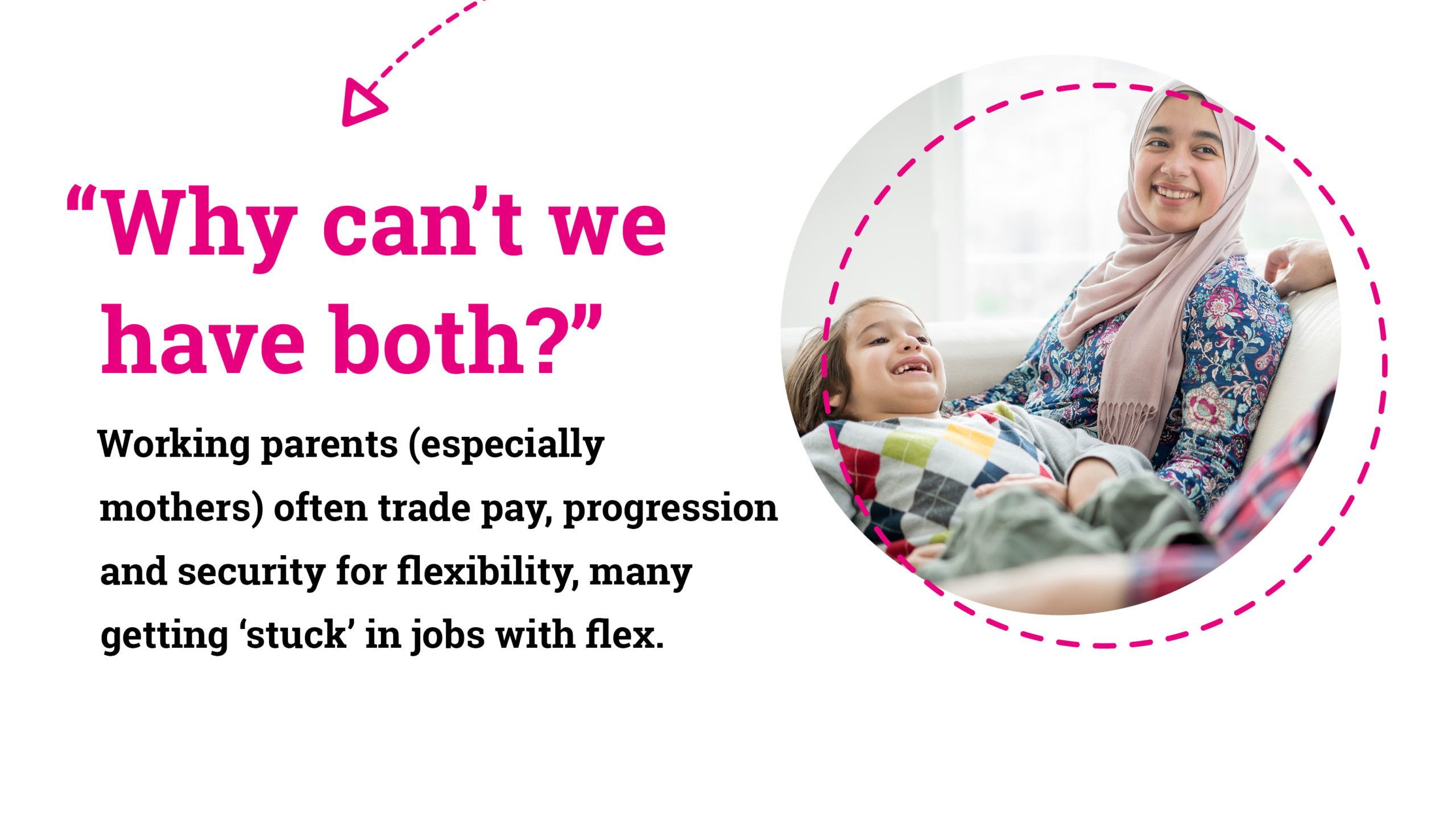Why can’t we have it all?
Published: 2 Nov 2021

Working Families CEO Jane van Zyl discusses our latest research with the Global Institute of Women’s Leadership, funded by the Nuffield Foundation.
Working Families exists to remove the barriers working parents and carers face in the workplace. We do this in three ways: empowering working parents and carers, supporting employers and driving positive policy change.
This year we’ve been delighted to have the opportunity to collaborate with King’s College on some vital new research to address an overlooked area in the context of family friendly policy and practice: job quality, and the trade-offs people make when they become parents. This is particularly relevant as in the last 18 months the trade-offs working parents make have been more visible than ever, and this research adds depth to that understanding and insights into the less visible decisions that many working parents have to take.
Job quality means different things to different people at different points in their lives. If we are serious as a society in wanting to improve jobs for all, then this requires building understanding of people’s experience of job quality and then supporting employers to listen and respond to their employees’ needs.
We’re really pleased this report provides practical recommendations for policy change – and with the Government’s Flexible Working consultation and promised Employment Bill we have opportunities for real world impact.
This research is valuable for providing deep insights into what parents want and expect from a job and the compromises they must make to meet caring responsibilities. We have seen the results from many surveys, including our own FlextheUK study, telling us that parents want to hold on to flexible arrangements they acquired through the pandemic. It’s good to learn more about what parents truly want: it’s not just about flexibility but also security and control.
I was particularly struck by the examples of parents in the report who spoke of the negative assumptions regarding their ambitions and desire to progress in work and similarly the number of parents who reported taking on lower paid jobs in which they had greater autonomy over when work was performed.
Evidence from the working parents and carers who contact our free legal advice services shows the challenges that parents face because of insecure working situations. They also highlight the need to have control over their schedules to manage their caring responsibilities. Flexibility is a key solution. It’s not the only one. This research is an important reminder for employers to respect and value their employees’ lives beyond work and foster supportive environments.
Recommendations 9 and 10 of this report call for greater engagement in workload planning – how important it is to ask working parents what they need and value at work and help them to achieve that rather than relying on assumptions. When an employee starts working flexibly, their workload needs to be reconfigured in a realistic way to account for the changes.
This research also highlights the inequalities facing parents, particularly mothers, in the workplace. They are at risk of making trade-offs that hinder their career progression, job satisfaction, and wellbeing. We work closely with employers that are leading the way in developing family friendly workplaces, but our annual Employers Benchmark continues to show that progression is a key area of focus – and activity in this area will be crucial to narrow gender pay gaps.
We believe employers should monitor part-time and flexible working in relation to employee characteristics, pay and progression, to make it clear if, and when, employees working flexibly (particularly part time) are getting ‘stuck’. Action in this area will reduce gender inequality.
We were pleased to hear the new BEIS Director for Employment say recently that the concept of job quality had been somewhat neglected but would be receiving more attention. We’ll be sharing this research with members of the Flexible Working Taskforce to reinforce this point.
As identified in the report, we’d encourage government to recognise the multifaceted role of flexible working and improved job quality in equalising opportunities, and we would like to see this considered as part of government’s Levelling-Up White Paper and its Plan for Jobs.
Working Families is currently drafting our response to the BEIS Flexible Working taskforce. The consultation sets out proposals for a day one right to request flexible working, to reduce to response time, and lift the cap of one request a year. The consultation also considers whether employers should show that they have considered alternative flexible arrangements when rejecting a request.
Even though we’d like to see government introduce a requirement for large companies to design and advertise flexibly, we will be arguing the case for these proposed changes as further steps towards providing working parents and carers with opportunities to access greater autonomy over their working arrangements.
Beyond our work on the Taskforce and input into the Consultation we will take the findings from this report to shape the future of our work in three ways:
- Work with our growing network of employer members across a range of sectors, some of which are new to this debate.
- Inform our co-creation work with our Academic Advisory Panel and the Families and Work Group – particularly as they scope out new research and policy influencing opportunities.
- Listen to parents and understand what they need and want in a job as we move beyond the pandemic – through our Parents & Carers Advisory Panel.
I’d particularly like to thank Dr Rose Cook and the team at The Global Institute for Women’s Leadership at King’s College, The Nuffield Trust, the University of East Anglia and at Working Families: Dr Sarah Dauncey, Lucy Devine and Mary Brown.
Read the report – Working parents, flexibility and job quality: What are the trade-offs?